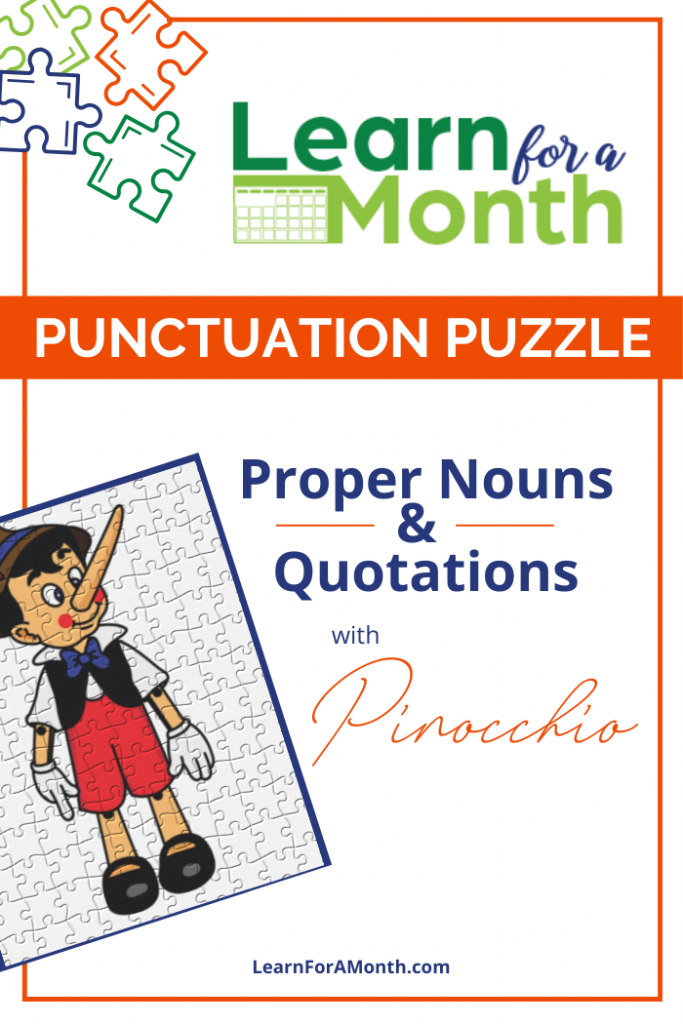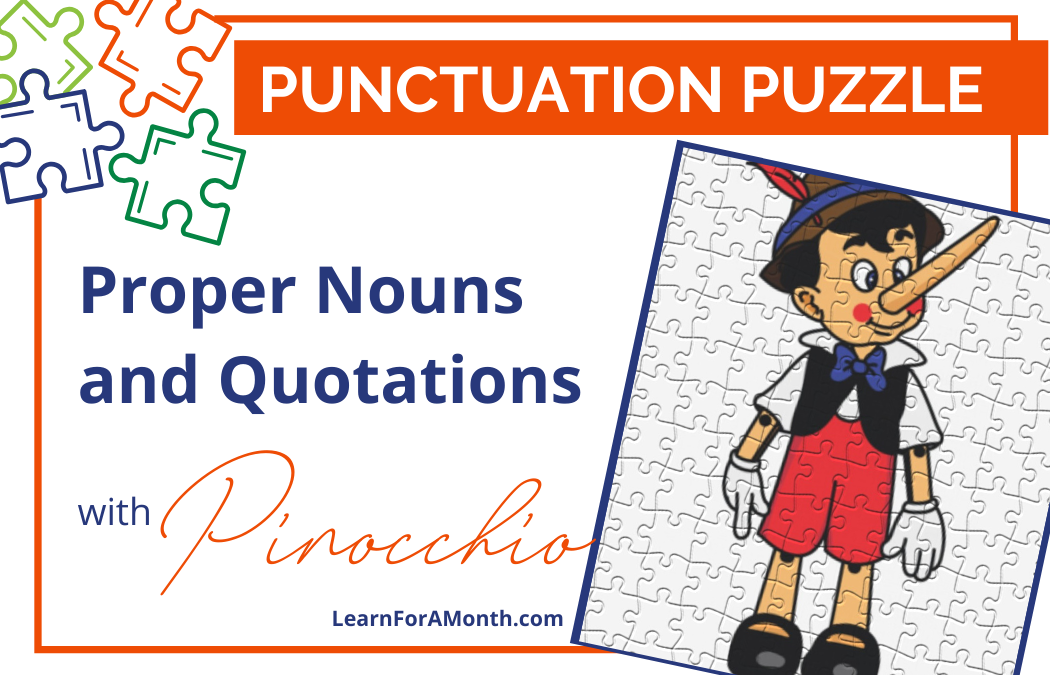Oh, proper nouns and quotations. Where do I start to explain the myriad of difficulties that students (and adults!) have with these. Am I starting to sound more like Lamenting Lady than Language Lady in the openings to these Punctuation Puzzles? If so, I am sorry! When you have taught fifty to one hundred students (in second through twelfth grades) English/language arts every semester for nearly twenty years (and you write books and products for them literally every year for nearly two decades as well), you just start to really feel sorry for these precious people who have to navigate the grammar waters with all of its exceptions and varying rules. (Sympathetic, she is!?)
I also feel compelled to share with parents and teachers what I have seen in teaching and writing materials with these rules—so you can understand how the exceptions and rules affect kids trying to learn them (to add to your list of things you have noted!).
When it comes to Proper Nouns and Quotations (capitalization for emphasis), here are some of the tough scenarios:
- Commas and periods ALWAYS go inside closing quotations marks–unless you are observing a traveling museum exhibit from Europe or reading English writers—then they could be inside or outside, based on the use
- Exclamation points and question marks go inside closing quotations when they are part of the quote….”Is this part of the quote?” Poor kids!
- With a closing speech tag and a declarative sentence, a comma is used rather than a period—because a sentence can only have one period used as a period. (“What about Dr. or Mrs. or etc.???”)
- Sometimes mother and father and mom and dad (etc.) are capped—and sometimes they aren’t! (Can’t give away every rule for this week’s puzzle in the opening!)
- Months, days, and holidays are capped—but seasons are not.
- Sometimes directions are capped and sometimes they aren’t!
- We say to not capitalize the common name of something but to capitalize the proper name of something—so not city but yes Fort Wayne; not school but yes Homestead; not dog but yes, I mean no poodle. Agghh…..
So what do we do? How do we help kids learn these exceptions, “rule breakers,” and more?
With great patience and love for kids first of all! ?
Then with constant interaction with the rules. Editing assignments like these Punctuation Puzzles (or my infamous Editor Duty assignments!) WITH discussion will go a long way.
When you grade student grammar assignments, any time you can, do it orally with their book in front of them. Have them pen in the corrections. Discuss ones the student missed.
When discussing these issues, tell how they are “just like this” or “similar to that”—associating what they already know with what you are trying to teach.
When they make these errors in their writing, correct them for the student! And tell them why….without marking down their grade for tricky ones that they are just learning.
AND…any time you can, use a “Tricky Trick to Help It Stick” (see my recent Tricky Trick downloadable sheets here and here!) Sometimes students don’t need long explanations and lists of rules as much as they need a trick or a tip that works over and over again that they can rely on.
Good luck with this week’s puzzles! (And don’t forget to comment or email me with topics you would like to see in future puzzles!)

PUZZLE:
“Listen to your Father, Pinocchio!”, the cricket pleaded.
The answer?
“Listen to your father, Pinocchio!” the cricket pleaded.
A. Proper Nouns
1. The first term we need to define to correct this sentence is the phrase proper noun.
a. A common noun, as you probably know, is a word that names a person, place, or thing.
b. A proper noun, however, names a specific person, place, or thing. For example,
The puppet sprinted down the street. (puppet is a common noun—that is, it does not name a specific puppet.)
Pinocchio sprinted down the street. [Pinocchio is a proper noun—it does name a specific puppet (Pinocchio).]
2. Proper nouns are always capitalized. For example, we always write Pinocchio like this, never like this: pinocchio.
3. Normally, it is fairly easy to tell the difference between common and proper nouns (exceptions notwithstanding!). However, in the case of our sentence, we are dealing with a word—father–that can be either common or proper, depending on how it is used. This is significant since we need to know whether to capitalize it or not.
4. We can identify whether father should be capitalized by whether it is referring to a specific father or not.
“My father would be happy if I brought back more money,” Pinocchio thought.
“I know Father would be happy if I brought back more money,” Pinocchio thought.
5. On the surface, it’s hard to tell which one is a common and which one is a proper noun.
a. However, in the 1st sentence, the pronoun my modifies father.
i. This pronoun is telling us the specific father we are talking about; without the pronoun, the word father would not be referring to a specific father.
ii. Therefore, father is not a proper noun in this sentence.
b. In the 2nd sentence, father is by itself, but it is not a common noun. Why not?
i. Well, the question we have to ask is, “Does the word father in this sentence refer to a specific father?”
ii. If you answered yes, you are correct. It refers to Pinocchio’s father, Geppetto.
iii. In fact, we could replace the word father with the name Geppetto, and we would get the same meaning
“Father would be happy if I brought back more money,” Pinocchio thought.
“Geppetto would be happy if I brought back more money,” Pinocchio thought.
Therefore, we capitalize father in this sentence since the word is a proper noun in this case.
TRICKY TRICK: If you can put the person’s name in place of the title (in place of father in this case), and it still makes sense, capitalize the title.
6. In our puzzle sentence, “Listen to your Father, Pinocchio!”, the cricket pleaded., Father is capitalized like it is a proper noun.
a. However, is it actually a proper noun? No, because the pronoun your is explaining the specific father we are referring to (Pinocchio’s father, Geppetto).
b. Therefore, the word father in this case is not a proper noun; it is a common noun and does not need to be capitalized.
“Listen to your father, Pinocchio!”, the cricket pleaded.
TRICKY TRICK: You can’t say “Listen to your Geppetto…”
B. Quotations with Exclamation Points/Question Marks
1. The second error in our sentence relates to how to use an exclamation point or question mark at the end of a quote. As you may know, a quote, followed by a speech tag, always ends with a comma, not a period. For example,
“Take these coins and buy a schoolbook, Pinocchio,” Geppetto commanded.
Not –
“Take these coins and buy a schoolbook, Pinocchio.” Geppetto commanded.
TRICKY TRICK: A sentence can only have one period used as a period/end mark.
2. However, what are we supposed to do when a quote ends in an exclamation point or question mark, before a speech tag?
a. In this case, we replace the comma with the exclamation point or question mark.
b. Otherwise, we would not know that the sentence was supposed to be an exclamation or a question.
c. Let’s observe how this appears in a sentence:
“Ha!” Pinocchio scoffed.
“Where is my father now?” Pinocchio wondered.
d. So, in the case of our sentence, should there be a comma after the exclamation point? No, the comma is replaced by the exclamation point, not just moved to the right.
That leaves us with our final, fully corrected sentence:
“Listen to your father, Pinocchio!” the cricket pleaded.
Today’s Punctuation Puzzle sentence comes from a student writing assignment found in the Pinocchio Twice-Told Tale product (a Really Writing) book available in January 2018 from the Character Ink Store, Teachers Pay Teachers, and CurrClick.


Trackbacks/Pingbacks